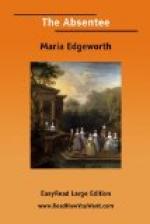It was some time before our hero could persuade the old woman to stick to Little Wrestham, or to Toddrington, and not to mix the directions for the different roads together—he took patience, for his impatience only confused his director the more. In process of time, he made out, and wrote down, the various turns that he was to follow, to reach Little Wrestham; but no human power could get her from Little Wrestham to Toddrington, though she knew the road perfectly well; but she had, for the seventeen last years, been used to go ‘the other road,’ and all the carriers went that way, and passed the door, and that was all she could certify.
Little Wrestham, after turning to the left and right as often as his directory required, our hero happily reached; but, unhappily, he found no Mr. Reynolds there; only a steward, who gave nearly the same account of his master as had been given by the old woman, and could not guess even where the gentleman might now be. Toddrington was as likely as any place—but he could not say.
‘Perseverance against fortune.’ To Toddrington our hero proceeded, through cross-country roads—such roads!—very different from the Irish roads. Waggon ruts, into which the carriage wheels sunk nearly to the nave—and, from time to time, ‘sloughs of despond,’ through which it seemed impossible to drag, walk, wade, or swim, and all the time with a sulky postillion. ‘Oh, how unlike my Larry!’ thought Lord Colambre.
At length, in a very narrow lane, going up a hill, said to be two miles of ascent, they overtook a heavy laden waggon, and they were obliged to go step by step behind it, whilst, enjoying the gentleman’s impatience much, and the postillion’s sulkiness more, the waggoner, in his embroidered frock, walked in state, with his long sceptre in his hand.
The postillion muttered ‘curses not loud, but deep.’ Deep or loud, no purpose would they have answered; the waggoner’s temper was proof against curse in or out of the English language; and from their snail’s pace neither Dickens nor devil, nor any postillion in England, could make him put his horses. Lord Colambre jumped out of the chaise, and, walking beside him, began to talk to him; and spoke of his horses, their bells, their trappings; the beauty and strength of the thill-horse—the value of the whole team, which his lordship happening to guess right within ten pounds, and showing, moreover, some skill about road-making and waggon-wheels, and being fortunately of the waggoner’s own opinion in the great question about conical and cylindrical rims, he was pleased with the young chap of a gentleman; and, in spite of the chuffiness of his appearance and churlishness of his speech, this waggoner’s bosom ‘being made of penetrating stuff,’ he determined to let the gentleman pass. Accordingly, when half-way up the hill, and the head of the fore-horse came near an open gate, the waggoner, without saying one word or turning his head, touched the horse with his long whip—and the horse turned in at the gate, and then came—




